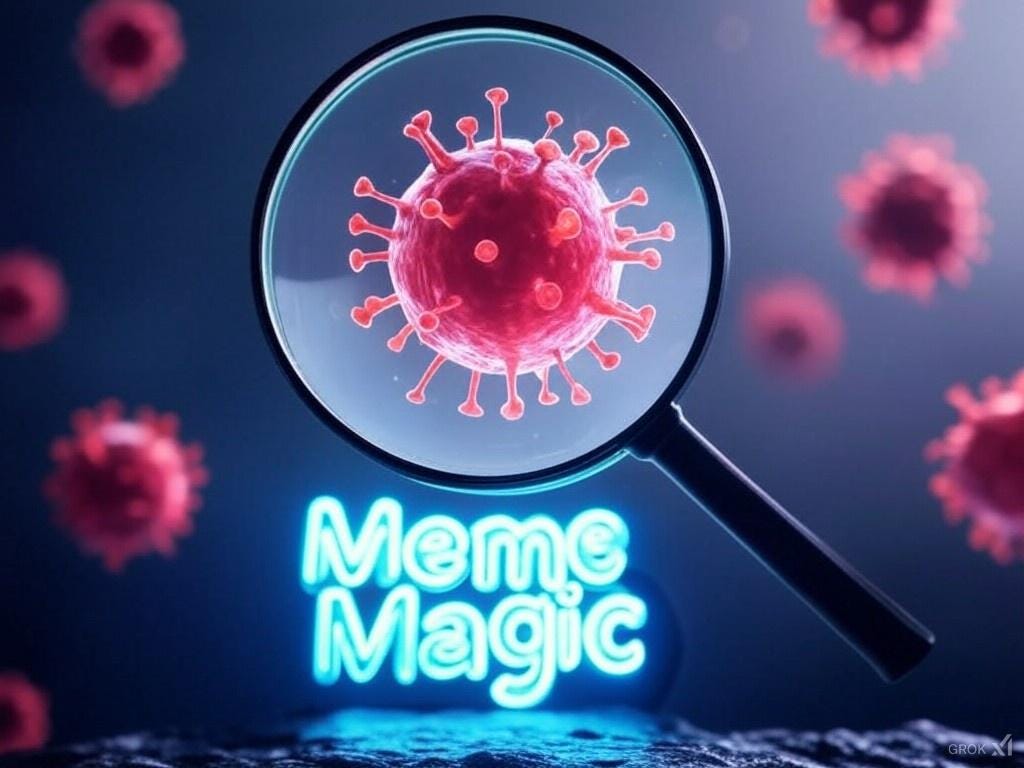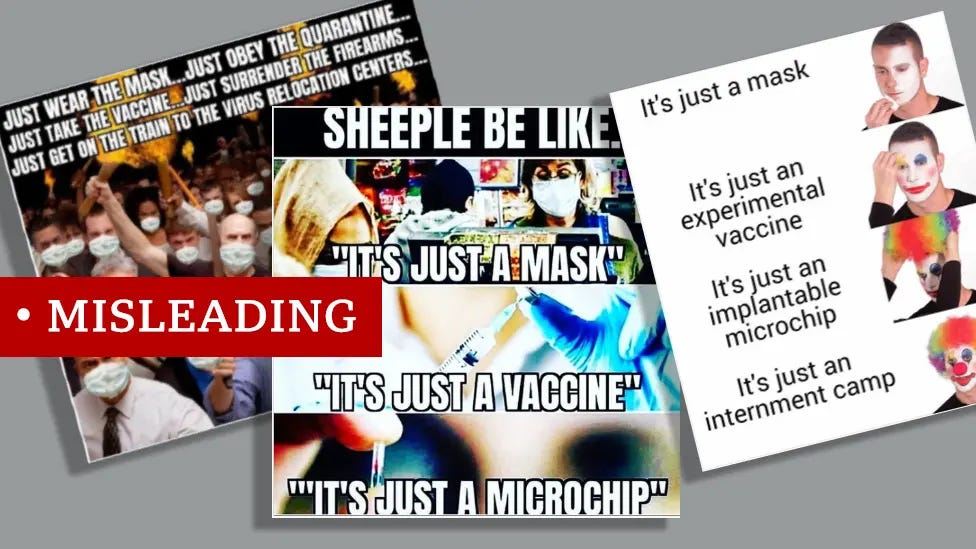The Uncovering the Corona Fraud series is an extra benefit for paid subscribers. It is made up of old Facebook posts that I did on various articles and studies throughout the last few years of the “pandemic.” I provide updated commentary to go along with each of the included posts. This series is an effort to review and learn from the past in order to avoid repeating the mistakes in the present and future.
When deciding on a theme for the introduction of this edition of Uncovering the Corona Fraud, I quickly realized how much influence memes had on me during this “pandemic.” For those unfamiliar with what a meme is, Merriam-Webster defines memes as “an amusing or interesting item (such as a captioned picture or video) or genre of items that is spread widely online, especially through social media.” These are typically images that convey information in a satirical or humorous way to grab people's attention.
Before the “pandemic,” I wouldn't have been considered “social media savvy.” While I enjoyed the occasional meme, I didn't fully grasp the power these images could have in planting seeds in the minds of viewers. Interestingly, it was a meme about the dangerous ingredients found in vaccines that sparked my initial questioning of this harmful pseudoscientific practice. However, it wasn’t until I started both sharing and creating my own memes that I truly understood their potential.
The power held in a meme is known as “meme magic,” which has been defined as the “(supposedly supernatural) power of internet memes to have a meaningful impact on the real world when used en masse in a targeted way.” The term itself traces its origins to March 2015 on forums such as 8chan as well as YouTube:
“The earliest uses of the term can be tracked to March 2015, when the Germanwings Flight 9525 crashed while en route to Düsseldorf, Germany and several online communities started drawing parallels with the memorable plane scene from The Dark Knight Rises. The first use comes from a webm titled "Meme Magick", created by YouTuber First Last (and reuploaded to his YouTube channel on August 6th, 2015), which was first posted on 8chan's random board /b/ and later on the Baneposting board /bane/.”
https://knowyourmeme.com/memes/meme-magic/
However, the term “meme magic” has become somewhat synonymous with right-wing groups, largely due to the popularity of the “Pepe the Frog” character, which circulated widely in memes during the 2016 presidential race in support of Donald Trump
Regardless of the alleged supernatural powers attributed to these images or the negative connotations of being associated with a partisan ideology, the impact these informational images can have in sparking curiosity is undeniable. As I’ve mentioned, I am living proof of this.
During the “pandemic,” memes became a powerful weapon in the fight against mainstream media misinformation and fear propaganda. Their effectiveness was so significant that the MSM frequently had to engage in damage control whenever a popular meme went “viral” online. These outlets worked hard to portray memes as sources of disinformation, urging people not to trust any meme-related content about the “coronavirus” or vaccines.
Covid-19: What’s the harm of ‘funny’ anti-vaccine memes?
Memes, often in the form of humorous images and videos, are a major part of how people communicate on the internet, but they can also be used to spread disinformation.
We've been looking at how these memes can present false and misleading information about Covid-19 vaccines, feeding into concerns about their efficacy or safety.”
“When memes have been appearing on social media feeds for months, some people start questioning if there's anything to these false or baseless claims.
"Memes like these can be disarming, because they tap into fears we all have about trust in science and medication side effects" says Joan Donovan, a lecturer at Harvard University, and an expert on disinformation.
"Tying together negative messaging to pop culture can be especially memorable and drive people to share because the meme is funny, outrageous, or sticky (memorable)."
https://www.bbc.com/news/55101238
Even the Bill Gates-backed Global Alliance for Vaccines and Immunization (GAVI) warned people about the threat of memes, arguing that they are manufactured and utilized by influencers to spread disinformation.
How memes became health disinformation super-spreaders
“Memes may appear trivial, but they should be taken seriously. Dismissing them as harmless jokes is to grossly underestimate their influence – and bolsters their power to spread potentially harmful health messages.”
“Memes may not look threatening – but that’s why they are such effective super spreaders of health disinformation.”
The widespread appeal of memes revealed why they posed such a threat to the official narrative. Memes are memorable, easily shared, and often provoke people to question the validity of the information they’ve been fed. Recognizing their potential as a powerful tool, I began using memes to grab attention while providing additional information for those willing to stop and read. In July 2020, my primary focus was on exposing the absurdity of masking as this was a rising threat, and so the majority of the memes were focused on pointing out the logical flaws, and potential dangers, of the practice. I’ve compiled numerous examples of some of the best memes I utilized at that time in this article.
Other topics covered include:
The spurious link between “Covid” and brain damage.
Numerous studies refuting the narrative that masks are effective.
Fighting back against school mask mandates through homeschooling.
Highlights from Dr. Stefan Lanka's early writings about “Covid.”
How mainstream media misrepresented statistics to create fear-inducing headlines.
The majority of positive tests occurring in asymptomatic (i.e., healthy) individuals.
The WHO's messaging often contradicted by their own “experts.”
And much more!
I hope you enjoy this retrospective look at the middle of July 2020.
Keep reading with a 7-day free trial
Subscribe to ViroLIEgy Newsletter to keep reading this post and get 7 days of free access to the full post archives.




